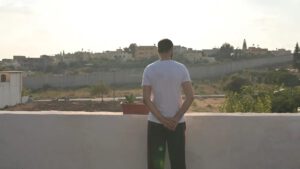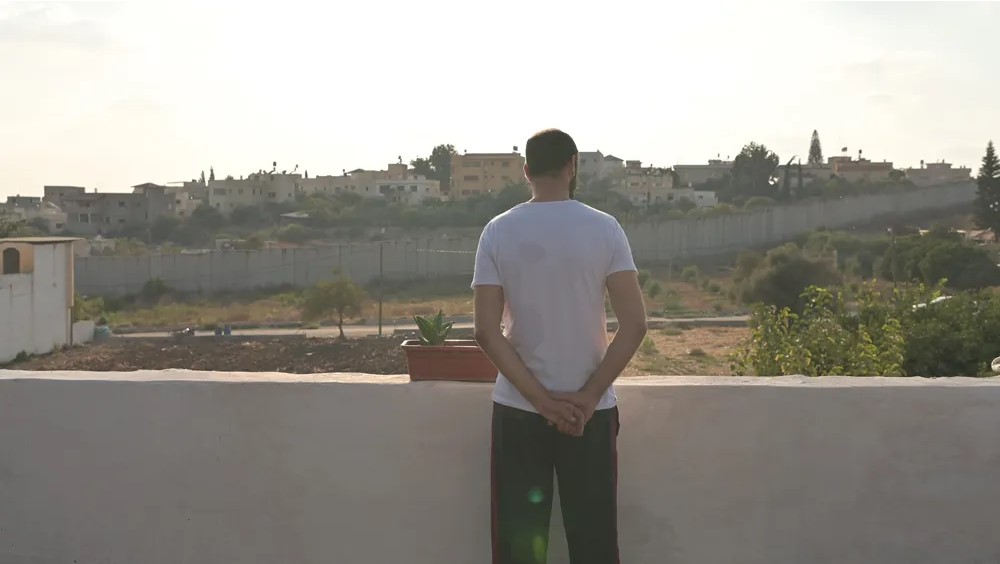Movie Info
Movie Info
- Director
- Ameen Nayfeh
- Run Time
- 1 hour and 36 minutes
- Rating
- Not Rated
VP Content Ratings
- Violence
- 2/10
- Language
- 2/10
- Sex & Nudity
- 1/10
- Star Rating
Relevant Quotes
But now in Christ Jesus you who once were far off have been brought near by the blood of Christ. For he is our peace; in his flesh he has made both into one and has broken down the dividing wall, that is, the hostility between us, abolishing the law with its commandments and ordinances, that he might create in himself one new humanity in place of the two, thus making peace…
Something there is that doesn’t love a wall,
That sends the frozen-ground-swell under it,
And spills the upper boulders in the sun;
And makes gaps even two can pass abreast.

Palestinian-Jordanian Ameen Nayfeh director/writer shows us the effect that the Israeli wall dividing the West Bank from Israel has on a Palestinian family. It is an effective tool for a better understanding of “the Palestinian situation” than an abstract discussion of the issues because it never preaches, but rather tells a story of an ordinary family caught up, not in the conflict itself, but in the drastic security measures imposed by the Israelis to prevent terrorists from crossing into their nation.
The title refers to the distance between a father named Mustafa (Ali Suliman, the consummate actor who starred in what was once my favorite film about Palestinians, Paradise Now), who lives with his mother in an apartment in a village of the Occupied Territories, and his wife Salwa (Lana Zreik) and three children reside on the Israeli side of the barrier. Not a very great distance, as the crow flies, but miles and miles for a Palestinian who must pass through crowded security checkpoints. Every bedtime Mustafa, standing on his balcony, says “Goodnight” over the phone and flashes his apartment lights, and the children and Salwa respond by flicking theirs off and on.
Mustafa is a construction worker whose job on the West Bank separates him most of the week from his family. When together, he loves rolling on the floor with the small children. His relationship with Salwa is strained because they are apart so much, though their love enables them to embrace after a quarrel. Salwa’s resentment is enhanced because Mustafa could secure a permanent work permit that would allow him to live and work in Israel, but he refuses out of resentment of what he sees as Israeli unjust treatment of his people.
One day he is up at dawn along with hundreds of others seeking to cross over for work. An official tells him his temporary permit has expired, and he is turned back. Frustrated because it is Friday, which means it will be Monday before he can apply for a renewal, he informs his wife. Then comes word from Salwa that their son Majd has been seriously injured by a car.
Desperate to join him in the hospital, Mustafa seeks out the smuggler Nader (Nabil Al Raai), who charges an outlandish price. The rest of the film becomes a road trip with the usual assortment of characters of that genre, among whom are Rami (Mahmoud Abu Eita), activist Kifah (Motaz Malhees) and his girlfriend Anne (Anna Unterberger), a German photographer said to have a Palestinian parent. She cluelessly takes pictures, making everyone uneasy—and at a couple of inappropriate times, endangering the entire party. I won’t go into all the dangers the illegal travelers encounter, both from Israelis and Palestinian hoodlums—just say that the tension and suspense are high, but the emotional payoff at the end is even higher.
Writer Ameen Nayfeh manages to show the injustices the Palestinians are forced to live under without painting all Israelis as heartless villains. Ann’s character is central to this in that late into the story we learn she is harboring a secret, and then, when the party is t the final Israeli checkpoint, she is crucial in their being waved on by a friendly female Israeli soldier who seeks from her advice about photography.
200 Meters (click on the title to watch it on YouTube) was the official submission of Jordan for the ‘Best International Feature Film’ category of the 93rd Academy Awards in 2021. As stated at the beginning, it is a good film to understand what thousands of Palestinians go through each day. This wall, like the proposed one across the US-Mexican border, is the result of fear and hostility. Although our fear has been stoked by American politicians for their own gain, the large number of Palestine suicide bombers that killed and injured Israelis before the barrier was erected (in 2002) were real. (The film mentioned above, Paradise Now, is set before the wall was built, and our star Ali Suliman in that film portrays one of two brothers who have vowed to cross over with bombs strapped to their bodies and blow up as many Israelis as possible.)
The good feeling evoked at the climax of Mustafa’s road trip is limited to his family–the bigger picture involving all Palestinians remains harsh and bleak—the wall still stands, and Mufasta will have to deal with it. People of faith will think of the Ephesian passage above in which Christ is said to have “broken down the dividing wall” of hostility. This Scripture plus my favorite Frost poem (the latter so frequently misunderstood!) always comes to mind when I see or hear people calling to build a wall to keep out the “undesirables.” For those of us looking at the conflict between Israelis and Palestinians, watching and discussing this film can be a first step in understanding the current war between the two peoples. Admittedly a small step, but that old adage remains true—the one about a journey of a thousand miles (this time toward understanding) beginning with one small step.
*Of interest, but not related to the film, is an article on how Robert Frost’s poem figured in a discussion of the barrier in the Israeli Knesset: “Robert Frost and Donkeys in the Knesset”
This review will be in the May 2024 issue of VP along with a set of questions for reflection and/or discussion. If you have found reviews on this site helpful, please consider purchasing a subscription or individual issue in The Store.

